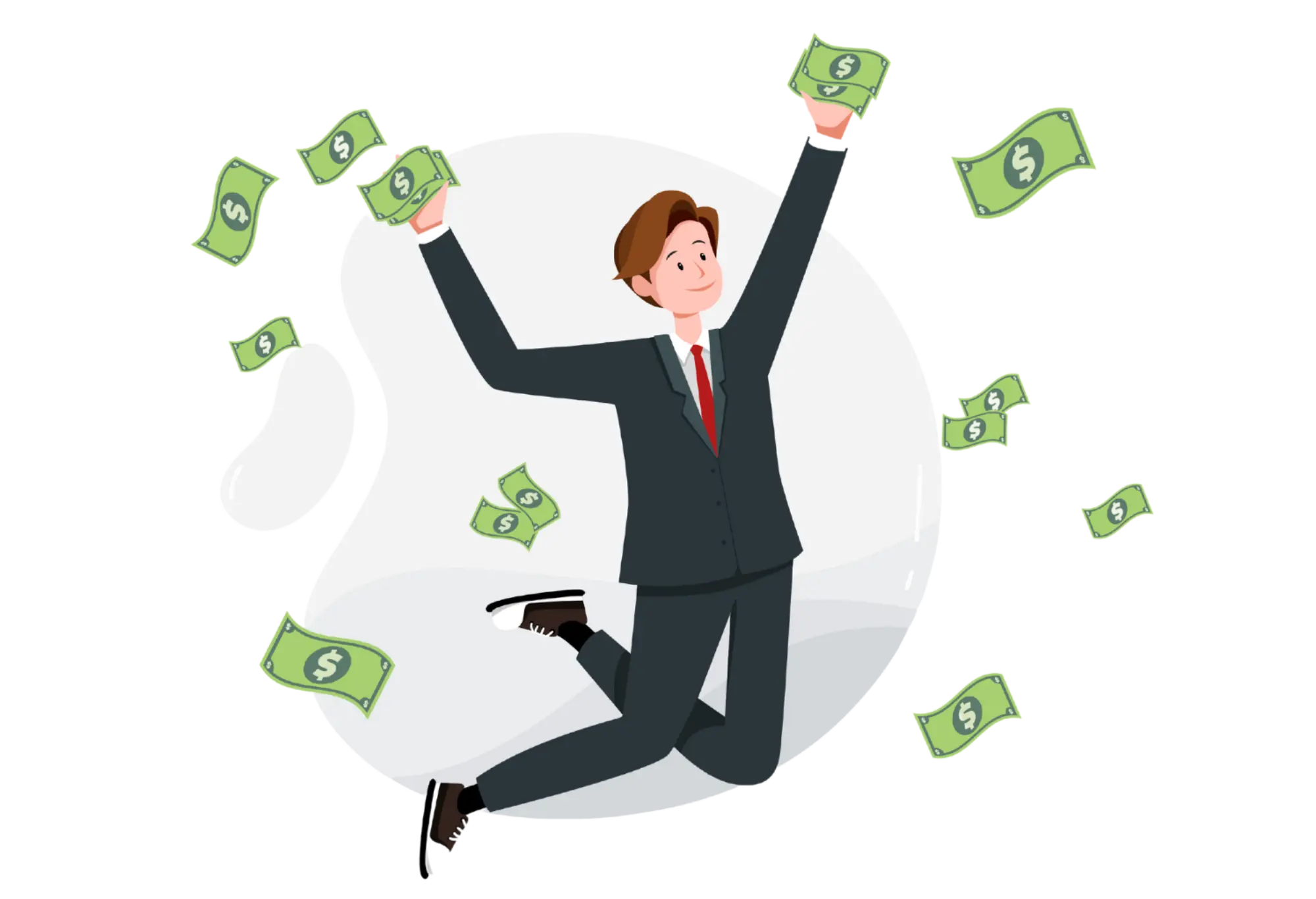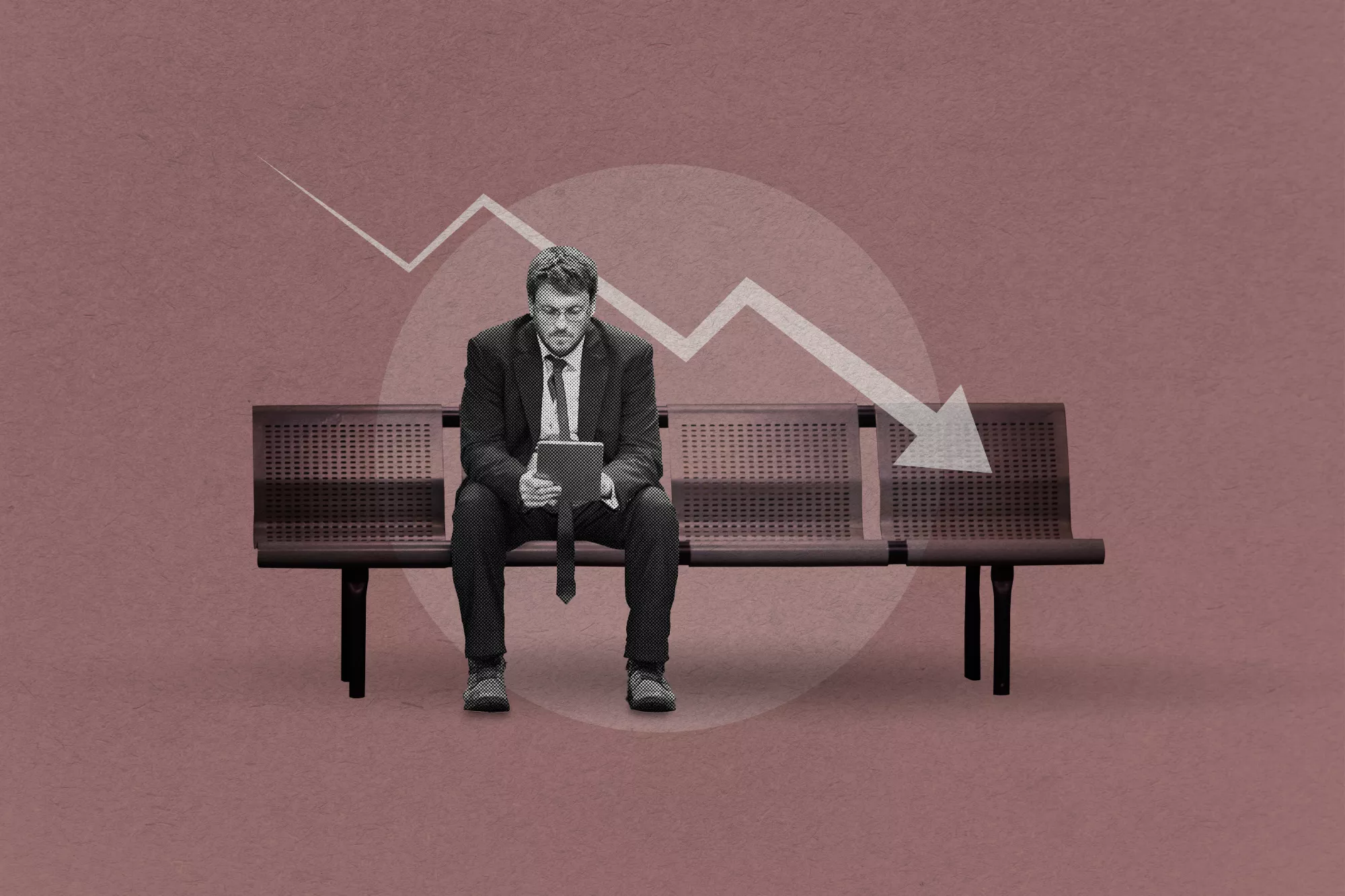
TABLE OF CONTENTS
What exactly is the difference between a recession and a depression? While the terms “recession” and “depression” are both used to describe periods of economic downturn, they indicate different economic conditions. To help you better grasp the differences between recessions and depressions, below examines the elements and implications of each, including their short- and long-term effects on the United States economy. Continue reading and you might just stop using “recession” and “depression” interchangeably.
What Is a Recession?
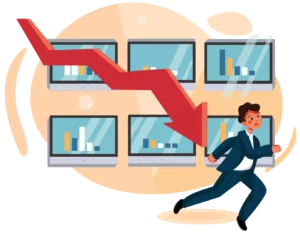
The National Bureau of Economic Research defines a recession as, “a significant decline in economic activity that is spread across the economy and lasts more than a few months.” The elements marking an economic recession include:
- A decline in the gross domestic product (GDP)
- An increase in the unemployment rate
- A decrease in household income
- A decline in consumer demand
- A decrease in production and retail sales
What Is a Depression?
Not all economic downturns are created equally. The term “depression” describes an economic downturn more server and drawn out than a recession. U.S. News and World Report define a depression as, “a period of sharp and sustained decline in economic activity that typically includes negative gross domestic product growth and a substantial rise in unemployment, poverty, and homelessness.
While there’s no formal definition of what constitutes a “sharp and sustained decline,” many experts state that an economic depression is when there is a drop in the GDP greater than 10 percent and a rise in the unemployment rate to over 20 percent, as well as a prolonged period of economic downturn greater than one year.
Recession vs Depression
Because recessions and depressions are both periods of economic downturns, they are, in fact, pretty similar. The main difference is that a depression is a longer period of more severe economic conditions. Such drastic economic conditions in one country tend to affect the world economy at large, whereas a recession may more easily be contained within one country.
The Causes of a Recession
Throughout history, some events have proven themselves to be triggers of economic recessions. That said, below are five incidents that often (but not always!) lead to economic recessions:
- Inflation: Inflation is the rate at which the prices of goods and services increase over time. Inflation can have both positive and negative effects on an economy. While inflation can stimulate economic growth by making it easier for businesses to finance expansion and invest in new technologies, it can also erode purchasing power, leading to a decline in living standards.
- Stock Market Crash: A stock market crash happens when there is a steep and sudden drop in stock prices. This may happen for a variety of reasons, including political instability or natural disasters. When the stock market crashes, people lose confidence in the economy and spend less money. Decreased consumer spending can lead to a decrease in production and layoffs, the latter of which may further decrease consumer spending.
- Rising Interest Rates: When interest rates are high, it becomes more expensive for businesses to borrow money for expansion. This can lead to a decrease in economic growth and an increase in unemployment.
- Asset Bubble Bursts: An asset bubble occurs when the price of an asset inflates beyond its true value and investors buy said asset without considering its actual worth. Eventually, the bubble will “burst,” at which point the asset may even plummet below its true value.
- Black Swan Events: A “black swan” event refers to an unpredictable incident with far-reaching ramifications. These events can cause a snowball of effects, potentially triggering economic decline.
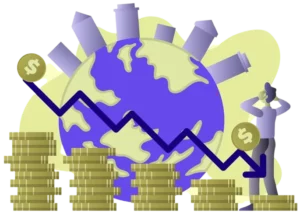
The Causes of a Depression
A depression often begins as a recession. If an economy declines far enough for long enough, there is then a case to be made that a recession has turned into a depression. As such, the events listed above as recession triggers may also be considered depression triggers. It is also important to keep in mind that it’s usually not an individual event, but a combination of a few events that can lead to economic conditions so dire they’re considered a depression.
The Great Depression vs the Great Recession
In the United States, the Great Depression and Great Recession were particularly difficult periods of economic downturn. Because they are prime examples of the terms after which they were named, examining these periods side-by-side may help you better grasp the economic differences between a recession and a depression[1]WallStreetMojo. “Great Recession vs Great Depression“. Accessed August 5, 2022.:
| The Great Depression | The Great Recession | |
| Major Inciting Incident | Stock Market Crash | Asset Bubble Burst |
| Estimated Duration | 10 years | 2 years |
| Peak Unemployment Rate | 25% | 10% |
| United States GDP | 30% decline | 4% decline |
Preparing for a Recession or Depression
Be it a recession or a depression, preparing for a period of economic downturn as a business owner is never easy. Here are a few approaches you can take to financially prepare yourself and your business to weather the storms of recessions and depressions:
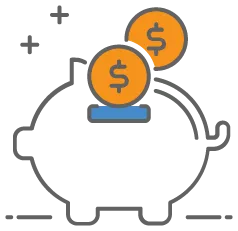
Budget
No matter the economic climate, properly managing your business’s balance sheet is important. To create a budget, list your non-negotiable business expenses. With your expenses listed, you can assess how much money you should have in your emergency fund. (Emergency funds aren’t just for individuals, but businesses too) Ideally, your business emergency fund should contain enough money to fund three to six months of your business’s operating expenses.[2]Nav. “Small Business Emergency Funds: Preparing For Financial Need“. Accessed August 5, 2022.
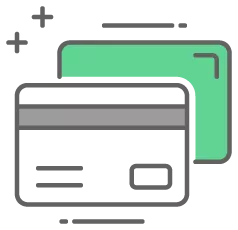
Credit
During periods of economic downturn, there’s typically a decline in investor confidence, as it may be more difficult for them to see a return on investment. Because access to capital can be more limited, it’s important to build a good business credit score before an economic downturn. To do so, maintain a favorable debt-to-income ratio and revolving credit utilization. Also, absolutely avoid late payments.
A good business credit score will increase your borrowing power, which can be extremely beneficial during periods in which access to capital is limited.
Depression vs Recession: Final Thoughts
To conclude, both recessions and depressions are periods of economic downturn. However, a depression lasts longer and generates worse economic conditions than a recession. Typically, a depression begins as a recession, which, if uncontrolled, snowballs into a state of depression. (Pro tip: If after reading this article you accidentally use “recession” and “depression” interchangeably in a conversation, feel free to clarify that you did so because an unmitigated recession can become a depression.)
Economies can be unpredictable. Even the most responsible business owner can be caught off-guard by a recession or depression. In this event, keep in mind that there are numerous business funding options to help you endure an economic downturn with your business intact.
Recession vs Depression FAQs
How many depressions has the United States had?
The United States has only had one economic depression in modern history: The Great Depression. Having changed the way many Americans thought about the economy, The Great Depression led to the creation of government programs like Social Security and unemployment insurance.
How many banks failed during the Great Depression compared to the Great Recession?
An estimated 9,000 banks failed during the Great Depression.[3]Social Security History. “The Depression”. Accessed August 5, 2022. In contrast, 492 banks failed during the Great Recession.[4]European Central Bank. “Commercial Bank Failures during the Great Recession: The Real (Estate) Story“. Accessed August 5, 2022. While this is not an apples-to-apples comparison because more small local banks existed in the early 1900s, it shows that the difference between a depression and a recession can be quite drastic.
Does a depression always follow a recession?
No, it does not. The United States has experienced over 13 economic recessions since the Great Depression, none of which snowballed into a depression.
When will a recession be classified as a depression?
A depression is a more severe economic downturn than a recession, characterized by significantly lower levels of production, employment, and trade. While the threshold for determining when a recession becomes a depression is somewhat arbitrary, it is generally agreed that an economic downturn must be prolonged and severe in order to be classified as a depression.
The most recent example of an economic depression was the Great Depression, which was characterized by widespread unemployment, falling prices, and shrinking output. While an economic recession can be painful for businesses and workers alike, an economic depression can be devastating, leading to long-term damage to an economy.
How did the Federal Reserve handle the Great Depression compared to the Great Recession?
In response to the Bank Panic of 1907, the Federal Reserve was established.[5]Investopedia. “Bank Panic of 1907”. Accessed August 5, 2022. Its primary objectives are to promote stability in the economy and prevent recessions.
In the wake of the Great Depression, the Federal Reserve took a number of steps to try to stabilize the economy: cutting interest rates, increasing the money supply, and lending directly to banks. The passing of the Social Security Act of 1935 is also viewed as a federal response to the Great Depression.
In response to the Great Recession, the Federal Reserve again cut interest rates, increased the money supply, and lent directly to banks. Additionally, federal authorities implemented regulatory policies in an attempt to limit security market speculation.
Because different events incited the Great Depression and Great Recession—a stock market crash and asset bubble burst respectively—the Federal Reserve adjusted its response to meet the specific conditions of each economic downturn.




